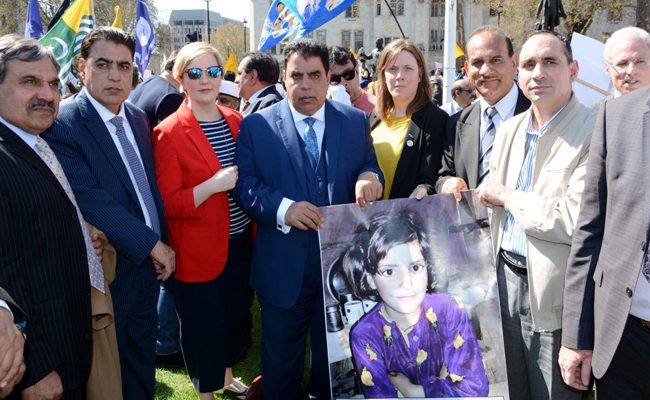Kashmiris, Sikhs, Christians and Dalits joined by others in huge display of Solidarity
London, 18 April 2018: Indian efforts to sweep under the carpet the deepening political and humanitarian crisis in territories it controls were given a major setback in Westminster on the very day Indian PM Modi was in London to meet the UK leadership. A protest organised by the ‘Minorities Against Modi’ campaign group saw thousands of protestors sending a vociferous message, on the steps of the UK Parliament, to the UK government, international organisations and the world’s media which highlighted the democratic deficit and the human rights abuses which PM Modi’s Hindutva movement is visiting on national homelands and religious minorities respectively.
Despite the Indian lobby organising a small counter protest, political heart of London was given a robust insight in to the divisive right-wing Hindutva policies that are not only threatening national and religious groups but also leading to unprecedented tensions with other states in South Asia.
The forcible denial of self-determination in Indian-controlled Kashmir and Punjab was a major theme of the protest with an unprecedented coming together of major diaspora organisations leading calls for UN intervention and the peaceable resolution of those conflicts by way of referenda to determine the destiny of those regions. India’s official rejection of Article 1 of the 1966 Covenants on Human Rights (which sets out the right of self -determination) has been criticised by the UN itself and has become a focal point for those that want to see progress in resolving intractable conflicts which have cost hundreds of thousands of lives over recent decades. Demands that India ‘Free Kashmir’ and ‘Free Khalistan’ were prominently displayed on large banners that would have caught the eye of the entire British political establishment which will need to heed the sentiments of its huge diaspora communities.
Equally prominent at the protest were calls for international intervention to protect religious minorities from the daily attacks and intimidation by Hindutva’s state and non-state actors. The appalling news this week of an eight-year-old girl being gang raped and killed by Hindu extremists in Kashmir (who were then shielded by BJP legislators) has disgusted the international community. The protestors said that attack typified the brazen aggression being unleashed by PM Modi’s Hindutva forces that see the cowardly targeting of national and religious minorities as their ‘majoritarian’ right. This polarisation and de-humanisation is now recognised by international observers, such as the US Commission on International Religious Freedom, as a dangerous and reprehensible trend which is supported by India’s constitutional, institutional and political set up.
The gathering was addressed by representatives from leading Sikh and Kashmiri diaspora organisations, as well as by senior leaders from Azad Kashmir, including the Prime Minister Raja Farooq Haider. In addition, a number of UK MPs attended the event and spoke in support of the demand that human rights be respected by the Indian PM. They included MPs Afzal Khan, Jess Phillips, Naz Shah, Preet Gill and Imran Khan.
Lord Nazir Ahmed (Chair, Parliamentarian for National Self-Determination), who raised these very issues of self-determination and other human rights this week in a debate in the House of Lords, called on the international community to take up the challenge of the fascist agenda of Hindutva politics. It was, he said, a threat to globally accepted norms and one that risked international peace and security. He joined with the protestors in delivering a memorandum to the Commonwealth Secretariat which called for the Commonwealth to hold PM Modi to account during this week’s Commonwealth Heads of Government Meeting in the UK.
Organisers, including Ranjit Singh Srai and Fahim Kayani, thanked Lord Ahmed for his unwavering support and pledged to build upon the impressive show of unity between diaspora communities in safeguarding the collective and individual human rights of the peoples being oppressed and traumatised by a Hindutva movement that aspires to the ideals of Hitler’s Nazis.
Placards and banners telling Indian PM Modi he was not welcome here in the UK reminded observers of the time he was officially boycotted by the UK government for his appalling human rights record. Many on this protest wished that boycott had remained in place but will now look to the UK, the Commonwealth and the UN to tackle him and his extremist backers on an agenda based on international law and the moral imperatives of a civilised world order.
